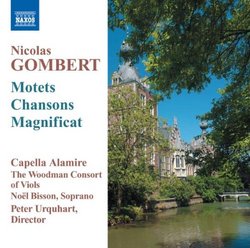| All Artists: Nicolas Gombert, Peter Urquhart, Capella Alamire, Noel Bisson, Woodman Consort Title: Nicolas Gombert: Motets; Chansons; Magnificat Members Wishing: 0 Total Copies: 0 Label: Naxos Original Release Date: 1/1/2006 Re-Release Date: 12/12/2006 Genres: Pop, Classical Styles: Vocal Pop, Opera & Classical Vocal, Chamber Music, Historical Periods, Classical (c.1770-1830) Number of Discs: 1 SwapaCD Credits: 1 UPC: 747313018079 |
Search - Nicolas Gombert, Peter Urquhart, Capella Alamire :: Nicolas Gombert: Motets; Chansons; Magnificat
 | Nicolas Gombert, Peter Urquhart, Capella Alamire Nicolas Gombert: Motets; Chansons; Magnificat Genres: Pop, Classical
|
Larger Image |
CD DetailsSimilar CDs |
CD ReviewsGravity is an Emotion Also ... Giordano Bruno | Wherever I am, I am. | 06/17/2010 (5 out of 5 stars) "... as a synonym for solemnity, that is, and if so, then Nicolas Gombert might arguably be the most emotional composer of the 16th C. Solemnity is certainly the predominant 'affect' in this performance of Gombert's motets and chansons, as it is in virtually every recorded performance of the composer who was esteemed in his own time as the successor to Josquin Deprez. It isn't sure that Gombert actually studied with Josquin, but he plainly absorbed Josquin's structured style. The difference that becomes most quickly apparent is that Gombert seldom "thinned" his five- and six-voice polyphony with the sort of flamboyant duo and trio sections that enliven Josquin's most solemn mass movements and motets.
Flamboyance wasn't Gombert's manner. Neither was experimentation. He was, in a sense, the most conservative composer of his generation, the most "Apollonian" and least "Dionysian", the consolidator rather than the expander of "Franco-Flemish" concepts of modality and tonality. Born in 1495, he was half a decade younger than Adriaan Willaert and Costanzo Festa and two decades younger than Antoine Brumel, but he was in every way less musically adventuresome than those three. Much of his career overlapped than of Cipriano de Rore (born in 1516), beside whose passionate chromaticism Gombert's music sounds ponderous and staid. He was the very soul of the "prima prattica" so soon to be revolutionized by Marenzio, Monteverdi, & Co. But does his music need to be so grave? Or has his art been miss-served by performances like this one from Capella Alamire and the Woodman Consort of Viols? Conductor Peter Urquhart has impeccable credentials as a musicologist; his editions have been used by other ensembles including the Tallis Scholars and the Orlando Consort. He knows his stuff, in short. The nine singers of Capella Alamire are thoroughly skilled professionals; their tuning and timbre is excellent, though like almost all recordings of choirs, they hardly sound realistic on this Naxos CD. Nevertheless, this performance involves aesthetic decisions of interpretation, and to my ears, those choices are less than satisfying. The most fundamental choice is tempo, and the tempi of these motets is ploddingly slow throughout, downright lugubrious at times. That flaw is exaggerated by the 'heaviness' of Urquhart's baton, as he thumps every downbeat of Gombert's insistently duple rhythm. Phrasing - the rhetorical flow of language - is the casualty of such a rigid meter. The seven French chansons - songs about human love sung by soprano Noël Bisson with polyphonic accompaniment by the Woodman Consort of Viols - suffer even more from excessive gravitas. On some of them, a tempo twice as fast would be more musically pleasing. The choice of a consort of violas da gamba accentuates the mournful earnestness of this performance. All apologies to my gamba-playing friends, but the gamba is the most doleful of instruments per se. The wonderful meditative gravity of the later English consort repertoire (Semper Dowland, semper dolens) suits the instrument perfectly and glories in its soulful duskiness. But here, on these delicate chansons, the gambas sound more dull than dolorous. The singing of Noël Bisson does nothing to lighten the musical damp; her voice is pure and straight, and almost uninflected. It's hard to believe that she's thinking of the words she sings at all. Perhaps I'm being overly harsh. It would be unreasonable to give this polished performance of extremely well-composed music less than five stars, especially when I can't recommend any other performance as notably more to my liking. All I can say is that I'm still waiting to hear the Gombert of my dreams." |

 Track Listings (16) - Disc #1
Track Listings (16) - Disc #1